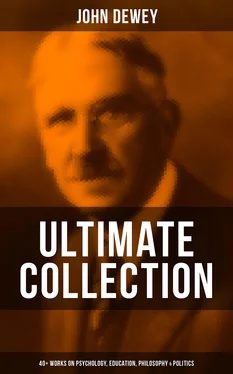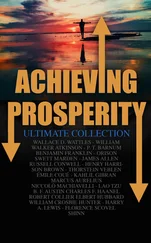John Dewey
John Dewey - Ultimate Collection: 40+ Works on Psychology, Education, Philosophy & Politics
Democracy and Education, The Schools of Utopia, Studies in Logical Theory
Published by
 Books
Books
Advanced Digital Solutions & High-Quality eBook Formatting
musaicumbooks@okpublishing.info2017 OK Publishing ISBN 978-80-7583-213-9
On Education On Education Table of Contents
Democracy and Education: An Introduction to the Philosophy of Education Democracy and Education: An Introduction to the Philosophy of Education Table of Contents
The Child and the Curriculum
The School and Society
Schools Of To-morrow
The Schools of Utopia
Moral Principles in Education
Interest and Effort in Education
Health and Sex in Higher Education
My Pedagogic Creed
On Philosophy
German Philosophy and Politics
Leibniz's New Essays Concerning the Human Understanding: A Critical Exposition
Studies in Logical Theory
Interpretation of Savage Mind
Ethics (with James Hayden Tufts)
The Problem of Values
Soul and Body
Logical Conditions of a Scientific Treatment of Morality
The Evolutionary Method As Applied To Morality: Its Scientific Necessity & Its Significance for Conduct
The Influence of Darwin on Philosophy
Nature and Its Good: A conversation
Intelligence and Morals
The Experimental Theory of Knowledge
The Intellectualist Criterion for Truth
A Short Catechism Concerning Truth
Beliefs and Existences
Experience and Objective Idealism
The Postulate of Immediate Empiricism
"Consciousness" and Experience
The Significance of the Problem of Knowledge
Essays in Experimental Logic
Reconstruction in Philosophy
Does Reality Possess Practical Character?
On Psychology
Psychology and Social Practice
Psychological Doctrine and Philosophical Teaching
Psychology as Philosophic Method
The New Psychology
How We Think
The Reflex Arc Concept in Psychology
The Psychology of Effort
Creative Intelligence: Essays in the Pragmatic Attitude et al.
The Ego as Cause
The Terms 'Conscious' and 'Consciousness'
On Some Current Conceptions of the term 'Self'
The Psychological Standpoint
The Theory of Emotion: Emotional Attitudes & the Significance of Emotions
The Psychology of Infant Language
Knowledge and Speech Reaction
Human Nature and Conduct: An Introduction to Social Psychology
On Politics
China, Japan and the U.S.A: Present-day Conditions in the Far East and Their Bearing on the Washington Conference
Letters from China and Japan
Criticisms of John Dewey
The Chicago School by William James
John Dewey's Logical Theory by Delton Thomas Howard
The Pragmatic Theory of Truth as Developed by Peirce, James, and Dewey by Denton Loring Geyer
Table of Contents
Democracy and Education:
An Introduction to the Philosophy of Education
Table of Contents
Table of Contents
Chapter One: Education as a Necessity of Life
Summary. It is the very nature of life to strive to continue in being
Chapter Two: Education as a Social Function
Summary. The development within the young of the attitudes and
Chapter Three: Education as Direction
Summary. The natural or native impulses of the young do not agree with
Chapter Four: Education as Growth
Summary. Power to grow depends upon need for others and plasticity
Chapter Five: Preparation, Unfolding, and Formal Discipline
Summary. The conception that the result of the educative process is
Chapter Six: Education as Conservative and Progressive
Summary. Education may be conceived either retrospectively or
Chapter Seven: The Democratic Conception in Education
Summary. Since education is a social process, and there are many kinds
Chapter Eight: Aims in Education
Summary. An aim denotes the result of any natural process brought to
Chapter Nine: Natural Development and Social Efficiency as Aims
Summary. General or comprehensive aims are points of view for surveying
Chapter Ten: Interest and Discipline
Summary. Interest and discipline are correlative aspects of activity
Chapter Eleven: Experience and Thinking
Summary. In determining the place of thinking in experience we first
Chapter Twelve: Thinking in Education
Summary. Processes of instruction are unified in the degree in which
Chapter Thirteen: The Nature of Method
Summary. Method is a statement of the way the subject matter of an
Chapter Fourteen: The Nature of Subject Matter
Summary. The subject matter of education consists primarily of the
Chapter Fifteen: Play and Work in the Curriculum
Summary. In the previous chapter we found that the primary subject
Chapter Sixteen: The Significance of Geography and History
Summary. It is the nature of an experience to have implications which
Chapter Seventeen: Science in the Course of Study
Summary. Science represents the fruition of the cognitive factors in
Chapter Eighteen: Educational Values
Summary. Fundamentally, the elements involved in a discussion of value
Chapter Nineteen: Labor and Leisure
Summary. Of the segregations of educational values discussed in the
Chapter Twenty: Intellectual and Practical Studies
Summary. The Greeks were induced to philosophize by the increasing
Chapter Twenty-one: Physical and Social Studies: Naturalism and Humanism
Summary. The philosophic dualism between man and nature is reflected in
Chapter Twenty-two: The Individual and the World
Summary. True individualism is a product of the relaxation of the grip
Chapter Twenty-Three: Vocational Aspects of Education
Summary. A vocation signifies any form of continuous activity which
Chapter Twenty-four: Philosophy of Education
Summary. After a review designed to bring out the philosophic issues
Chapter Twenty-five: Theories of Knowledge
Summary. Such social divisions as interfere with free and full
Chapter Twenty-six: Theories of Morals
Summary. The most important problem of moral education in the school
Chapter One:
Education as a Necessity of Life
Table of Contents
1. Renewal of Life by Transmission. The most notable distinction between living and inanimate things is that the former maintain themselves by renewal. A stone when struck resists. If its resistance is greater than the force of the blow struck, it remains outwardly unchanged. Otherwise, it is shattered into smaller bits. Never does the stone attempt to react in such a way that it may maintain itself against the blow, much less so as to render the blow a contributing factor to its own continued action. While the living thing may easily be crushed by superior force, it none the less tries to turn the energies which act upon it into means of its own further existence. If it cannot do so, it does not just split into smaller pieces (at least in the higher forms of life), but loses its identity as a living thing.
As long as it endures, it struggles to use surrounding energies in its own behalf. It uses light, air, moisture, and the material of soil. To say that it uses them is to say that it turns them into means of its own conservation. As long as it is growing, the energy it expends in thus turning the environment to account is more than compensated for by the return it gets: it grows. Understanding the word "control" in this sense, it may be said that a living being is one that subjugates and controls for its own continued activity the energies that would otherwise use it up. Life is a self-renewing process through action upon the environment.
Читать дальше

 Books
Books










